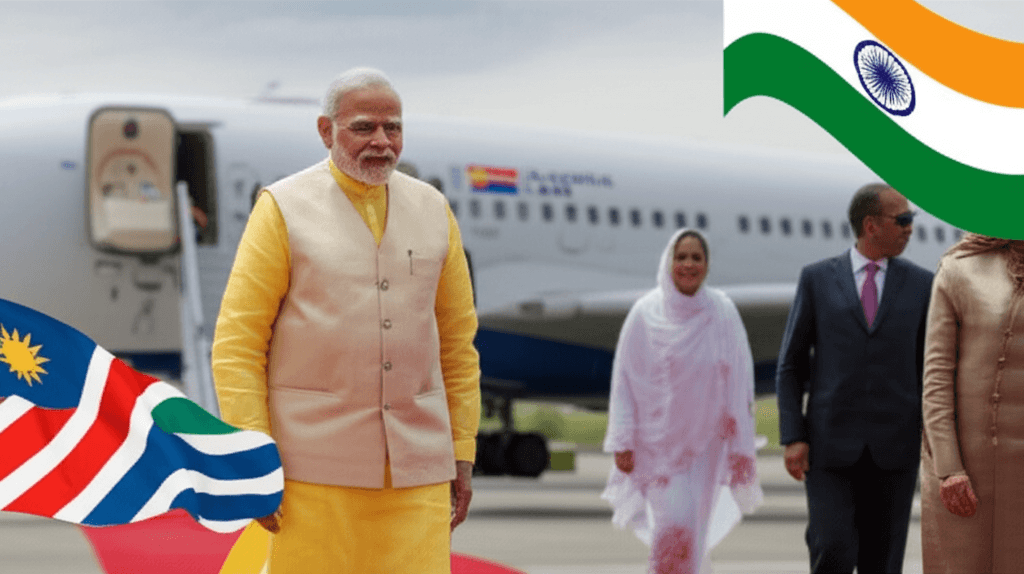PM Modi's Diplomatic Sprint: From Brazil's Global Stage to Namibia's Strategic Shores
Prime Minister Narendra Modi has officially departed Brazil for Namibia, continuing a pivotal multi-nation tour that underscores India's deepening commitment to the Global South and its strategic partnerships across continents.

PM Modi's Diplomatic Sprint: From Brazil's Global Stage to Namibia's Strategic Shores
In a significant development for India's foreign policy, Prime Minister Narendra Modi has successfully concluded his visit to Brazil and is now en route to Namibia. This shift marks the continuation of a crucial diplomatic journey, highlighting India's expanding global footprint and its intensifying engagement with nations of the Global South. The move from the vibrant, economically dynamic landscape of Brazil to the resource-rich, strategically important nation of Namibia isn't just a change of scenery; it's a calculated progression in India's broader diplomatic strategy.
This multi-leg tour isn't merely about bilateral meetings; it's a testament to India's aspirations as a rising global power, keen on fostering partnerships that align with its vision of a multipolar world order. From the G20 discussions in Brazil to the anticipated engagements in Namibia, every stop on this diplomatic sprint is meticulously designed to reinforce India's position, strengthen economic ties, and promote south-south cooperation.
Recap from Brazil: Strengthening the BRICS & G20 Foundation
The Brazil leg of Prime Minister Modi's tour was, by all accounts, highly productive, setting a robust foundation for future collaborations. Brazil, as a fellow BRICS member and a key player in the G20, shares many common interests and global outlooks with India. The discussions there weren't just routine diplomatic exchanges; they delved deep into critical areas like economic resilience, sustainable development, climate action, and the reform of multilateral institutions.
A significant focus was undoubtedly on the broader global trends impacting economies, including digital transformation and green energy transitions. India and Brazil, both large developing economies, have a shared interest in shaping global narratives that are equitable and inclusive. Bilateral trade and investment were key agenda items, with both leaders exploring avenues to diversify their trade baskets beyond traditional commodities and enhance collaboration in technology, agriculture, and defense. The emphasis was clearly on creating more resilient supply chains and leveraging each other's strengths for mutual economic growth. Discussions on renewable energy, particularly biofuels, also gained prominence, aligning with both nations' commitments to combating climate change and reducing carbon footprints.
Furthermore, their conversations likely touched upon the ongoing discussions within BRICS regarding its expansion and enhanced role in global governance. As two of the original members, India and Brazil's alignment on these matters is crucial for the bloc's future trajectory. The engagement in Brazil underscored a shared commitment to multilateralism and a recognition that global challenges require collective, coordinated responses rather than unilateral actions.
Namibia: The Next Horizon in Southern Africa
Following the strategic engagements in Brazil, PM Modi's arrival in Namibia marks a distinct, yet equally significant, chapter in India's diplomatic outreach. Namibia, a nation rich in natural resources and possessing a strategic coastline, holds considerable importance for India's 'Act Africa' policy. India's relationship with African nations isn't new; it's steeped in a history of solidarity, particularly during the anti-apartheid movement, and a shared vision of South-South cooperation.
Why Namibia now? Geopolitically, Namibia is a stable democracy in a region of increasing strategic importance. It's rich in minerals, including uranium, diamonds, and critical minerals essential for new-age technologies. For India, securing access to these resources is a key aspect of its energy security and industrial growth strategy. Beyond resources, Namibia’s ports offer strategic access to the Atlantic, which can be vital for trade routes and maritime security cooperation. India views African nations not merely as recipients of aid but as partners in development, commerce, and security.
The focus on Namibia also aligns with India's broader commitment to bolstering the African voice on the global stage. India has consistently advocated for greater African representation in international bodies, including a permanent seat in the UN Security Council. This visit is an affirmation of that commitment, aiming to solidify bilateral ties and open new avenues for collaboration that benefit both nations.
Historical Bonds and Future Prospects
The historical ties between India and Namibia are robust, dating back to India’s unwavering support for Namibia’s independence movement. India was one of the first countries to recognize and support the South West Africa People's Organization (SWAPO), providing moral, material, and diplomatic assistance. This historical goodwill forms a strong bedrock for contemporary relations. The visit is an opportunity to revitalize these bonds and translate them into concrete, forward-looking partnerships.
Namibia, for its part, sees India as a reliable partner in its developmental journey, capable of providing not just financial assistance but also technical expertise, capacity building, and technology transfer, without the conditionalities often associated with aid from other global powers.
Deepening Bilateral Ties: What's on the Agenda?
While specific details of the agenda are often revealed during the visit itself, one can anticipate several key areas of discussion and potential agreements between Prime Minister Modi and his Namibian counterparts.
- Trade & Investment: India is looking to enhance its presence in Namibia’s mining sector, particularly for critical minerals. Discussions will likely revolve around Indian investments in exploration, extraction, and processing. Beyond mining, opportunities in agriculture, pharmaceuticals, and manufacturing are also ripe for exploration. Namibia could benefit from India's expertise in these sectors, attracting investments that lead to job creation and economic diversification.
- Defense & Security Cooperation: India has been steadily expanding its defense ties with African nations. With Namibia's long coastline, maritime security will likely be a significant point of discussion, including cooperation on anti-piracy operations, training, and potential defense equipment sales or joint ventures. India's growing domestic defense manufacturing capabilities make it an attractive partner.
- Capacity Building & Human Resource Development: A cornerstone of India's development cooperation with African nations is capacity building. This involves scholarships under the Indian Technical and Economic Cooperation (ITEC) program, training programs in various fields, and assistance in establishing educational and vocational training institutions. Expect announcements on increased scholarships and training opportunities for Namibian professionals and students.
- Healthcare & Pharmaceuticals: India is a global leader in generic pharmaceuticals. This expertise can be crucial for Namibia's public health infrastructure. Discussions might include affordable drug supply, setting up pharmaceutical manufacturing units, and sharing best practices in healthcare delivery.
- Technology & Digital Transformation: India's remarkable strides in digital public infrastructure, often referred to as the 'India Stack,' are a model for many developing nations. Namibia could be keen to leverage India's experience in digital payments (like UPI), Aadhaar-like digital identity systems, and other e-governance solutions. This could transform service delivery and financial inclusion in Namibia. Indeed, India’s digital revolution is just beginning, offering vast potential for collaboration.
India's Vision for the Global South: Beyond Bilateralism
Prime Minister Modi's visit to Brazil and Namibia isn't just a series of isolated bilateral engagements; it's a coherent part of India's overarching foreign policy framework that places the Global South at its core. India sees itself as a natural leader and a strong voice for developing countries, advocating for their concerns on platforms like the G20, BRICS, and the United Nations.
This strategy is rooted in several key tenets:
- Voice of the Voiceless: India consistently champions the concerns of developing nations regarding climate finance, equitable trade practices, debt relief, and access to technology. It seeks to ensure that their perspectives are not marginalized in global decision-making bodies.
- South-South Cooperation: India promotes a model of cooperation based on mutual respect, shared experiences, and non-interference, distinct from traditional North-South development assistance models. This emphasizes peer-to-peer learning and tailored solutions.
- Multilateralism & Reforms: India actively advocates for reforms in global governance institutions to make them more representative and democratic. The current structure, largely a relic of the post-WWII era, no longer reflects the contemporary geopolitical and economic realities. India's engagement with Brazil and Namibia reinforces this call for a more inclusive global order.
- Strategic Autonomy: India's foreign policy seeks to maintain strategic autonomy, engaging with all major powers while forging strong partnerships with like-minded developing nations to create a balanced global order. This approach allows India to pursue its national interests while contributing to global stability and prosperity.
- Economic Partnerships: Diversifying economic partners is crucial for India. By strengthening ties with countries like Brazil and Namibia, India aims to create new markets for its goods and services, secure critical resources, and foster resilient supply chains, reducing over-reliance on any single region or power.
This diplomatic marathon is also a testament to India's growing economic heft and technological prowess. As a rapidly growing economy with a burgeoning digital infrastructure, India has a lot to offer its partners in the Global South, from affordable technology solutions to expertise in sustainable development and inclusive growth. It's a relationship built on sharing success, not just providing aid.
The Diplomatic Marathon Continues
The demanding schedule of Prime Minister Modi's multi-nation tour underscores the intensity and strategic importance of these engagements. Every handshake, every discussion, and every signed agreement is a carefully placed piece in the intricate puzzle of India's foreign policy. The shift from Brazil to Namibia highlights the broad scope of India's international ambitions – engaging with established economic powerhouses on global governance while simultaneously nurturing deeper ties with strategically vital partners in emerging regions.
As the world watches, India's diplomatic efforts in the Global South are aimed at shaping a more equitable and multipolar world. The outcomes of the Namibia visit, building on the momentum from Brazil, will be crucial in defining the next chapter of India's engagement with Africa and its continued rise as a responsible and influential global actor. It's a journey that speaks volumes about India's commitment to its partners and its vision for a truly interconnected and collaborative future.
Comments
Loading comments...
Related Articles

Olivia Nuzzi's 'American Canto': A Deep Dive into Her Highly Anticipated New Book
Political journalist Olivia Nuzzi is set to captivate readers with her new book, 'American Canto,' promising an unfiltered, deeply immersive journey into the heart of contemporary American politics. This article explores Nuzzi's distinctive voice, her career trajectory, and the profound themes readers can expect from her latest literary endeavor.